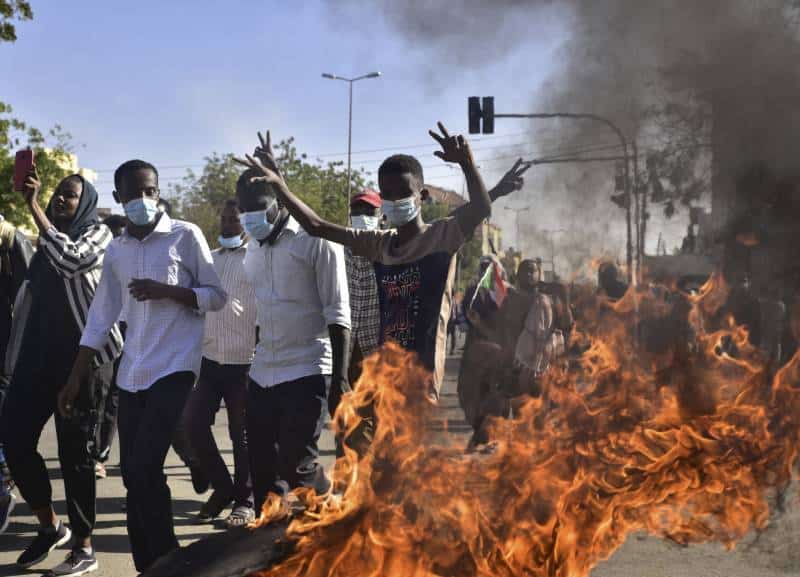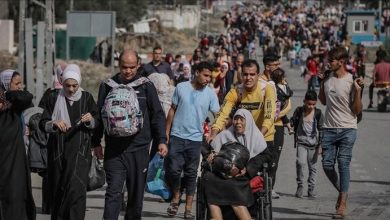Tear gas fired at Sudan protests as thousands rally against military

Sudanese security forces fired tear gas Tuesday at anti-coup protesters who chanted slogans in defiance of the military in Khartoum and other cities, witnesses said, days after the civilian premier resigned.
Protesters shouted “No, no to military rule” in the capital and called for the disbandment of Sudan’s ruling council headed by General Abdel Fattah al-Burhan, who led an October 25 coup that derailed a transition to civilian rule.
Streets leading to the presidential palace and army headquarters were sealed off by hefty deployments of troops, riot police and paramilitary units, witnesses said.
Security forces fired tear gas near the palace, and later at another rally north of the capital and in the eastern city of Port Sudan.
The protesters also gathered in Khartoum’s twin city Omdurman and the South Darfur capital Nyala, taking the total on the streets across the country into the thousands.
Prime Minister Abdalla Hamdok resigned late Sunday — six weeks after he was reappointed by Burhan — saying the country was now at a “dangerous crossroads threatening its very survival”.
The military chief had dismissed both Hamdok and the government in his October coup, dismantling an ever-precarious power-sharing arrangement between the military and civilians that had been established in the wake of a April 2019 ouster of longtime autocrat Omar-al-Bashir.
‘People’s choice’
The coup — one of several in Sudan’s post-independence history — has triggered mass demonstrations and a bloody crackdown that has left at least 57 people dead and hundreds wounded, according to the independent Doctors’ Committee.
Emad Mohamed, a witness in Wad Madani, south of Khartoum, said protesters carried the Sudanese flag and were beating drums as they chanted “civilian rule is the people’s choice”.
Demonstrators in east Khartoum “burnt car tyres and built brick barricades on the streets,” witness Sawsan Salah said.
Other protesters urged the military “to go back to the barracks.”
Pro-democracy activists have stepped up calls for demonstrations since the October coup, which saw Hamdok and cabinet ministers detained.
At least 13 women have allegedly been raped during the unrest, according to the United Nations.
When Burhan reinstated Hamdok on November 21, the latter accepted partly on the promise of elections in mid-2023, but the protest movement slammed the deal as a “betrayal” and has kept up its rallies.
‘Urgent action’
Arab League chief Ahmed Aboul Gheit said Tuesday that he “respects” Hamdok’s decision and called for “urgent action” to resolve the crisis.
UN chief Antonio Guterres “regrets that a political understanding on the way forward is not in place despite the gravity of the situation in Sudan”, UN spokesman Stephane Dujarric said on Monday.
On Tuesday, Burhan met with US Charge d’Affairs Brian Shukan, stressing the need to “continue dialogue between all sides to come up with a national consensus programme,” according to a statement by Burhan’s office.
His office also said he had met with UN special representative Volker Perthes over “the current political situation” and discussed “speeding up the appointment of a new prime minister.”
The transitional government was established in August 2019 after months of bargaining between the military and civilians.
Both sides played their part in Bashir’s fall — an unprecedented wave of youth-led protests culminated in enormous demonstrations that prompted the military to depose him after 30 years in power.
Last month, Burhan issued a decree allowing security forces to arrest individuals for crimes contravening a state of emergency, effectively banning street protests.
Security forces are allowed to enter and search “any building or individual” and impose “surveillance of any property and facility”, while internet services have frequently been disrupted to forestall large gatherings.
Activists online have urged demonstrators to keep heading to the presidential palace “until victory is achieved”, according to the Sudanese Professionals Association, an alliance of independent trade unions that was instrumental in the anti-Bashir protests.





